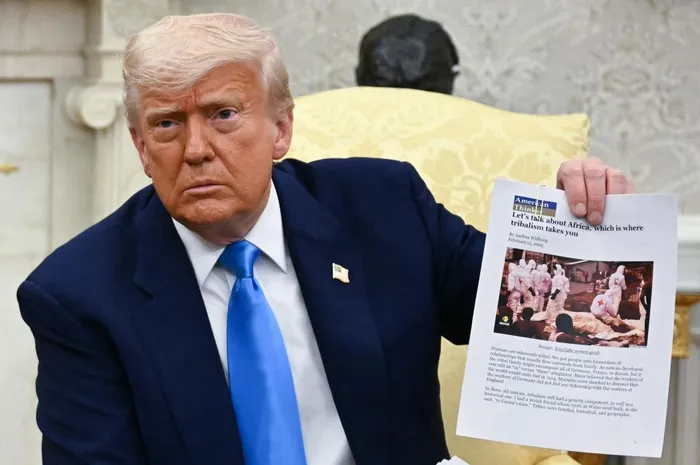Does Malema prove white genocide? Trump thinks so

Exploring Trump's assertion: Is Julius Malema a symbol of white genocide in South Africa?
Image: AFP
During his meeting with President Cyril Ramaphosa in Washington on Tuesday, US President Donald Trump focused on his repeated disinformation that White South African farmers were victims of genocide in South Africa.
Trump seemed to ambush Ramaphosa by presenting a series of video recordings of EFF leader Julius Malema singing "Kill the Boer" and other songs about the slaughter of white people.
The singing of the controversial struggle song has been repeatedly upheld by the country's courts due to the historical context, yet this was not mentioned in the crucial meeting.
In his audio-visual presentation, Trump appeared to single-handedly point at Malema as proof of white genocide in the country. He also asked Ramaphosa why Malema has not been arrested.
In response, Malema said that there is no reliable information or evidence to back up the assertion of a 'white genocide' in South Africa. He also emphasised the EFF's uncompromising position on land reform.
"We will not agree to compromise our political principles on land expropriation without compensation for political expediency," the EFF leader posted on X.
But what exactly constitutes genocide?
The term genocide carries profound legal and moral weight, yet its definition remains contested in international discourse. According to the 1948 United Nations Convention on the Prevention and Punishment of the Crime of Genocide, it is defined as acts committed with 'intent to destroy, in whole or in part, a national, ethnical, racial or religious group.'
These acts include killing members of the group, causing serious bodily or mental harm, deliberately inflicting conditions of life calculated to bring about its destruction, imposing measures to prevent births, and forcibly transferring children.
The definition is clear in principle but complex in practice.
Human rights organisations argue that the political reluctance to label atrocities as genocide often hinders a timely international response. "Genocide is not just about mass killings," said Agnès Callamard, Secretary General of Amnesty International. "It's about a systematic attempt to erase a people's identity, culture and very existence. Waiting for legal determinations should never delay action to prevent further atrocities."
Recent crises, including the ongoing conflict in Sudan and the treatment of the Rohingya in Myanmar, have reignited international debates over when and how the term should be applied.
"The world has learned too many times that hesitation leads to catastrophe," said Tirana Hassan, Executive Director at Human Rights Watch. "The international community failed in Rwanda, Srebrenica and Myanmar. Labelling genocide should not be a political decision. It is a moral and legal imperative."
In December 2023, the United Nations Human Rights Council released a report accusing Sudanese government-linked forces of committing atrocities 'indicative of genocidal intent' in West Darfur. Despite the findings, no formal declaration of genocide has been made by the UN Security Council.
"Political considerations often outweigh the facts. Powerful states on the Security Council frequently block genocide designations to avoid diplomatic fallout or intervention obligations," said Kenneth Roth, former director of Human Rights Watch.
The International Court of Justice (ICJ) is currently examining a case brought by South Africa accusing Israel of violating the Genocide Convention through its military operations in Gaza.
In a formal submission to the ICJ in December 2023, South Africa alleged that Israel’s actions in the enclave were 'genocidal in character,' asserting that they aim to destroy, in whole or in part, the Palestinian population.
The filing includes documented evidence of mass civilian deaths, widespread displacement, and the destruction of essential infrastructure such as hospitals, homes, and water systems.
IOL News